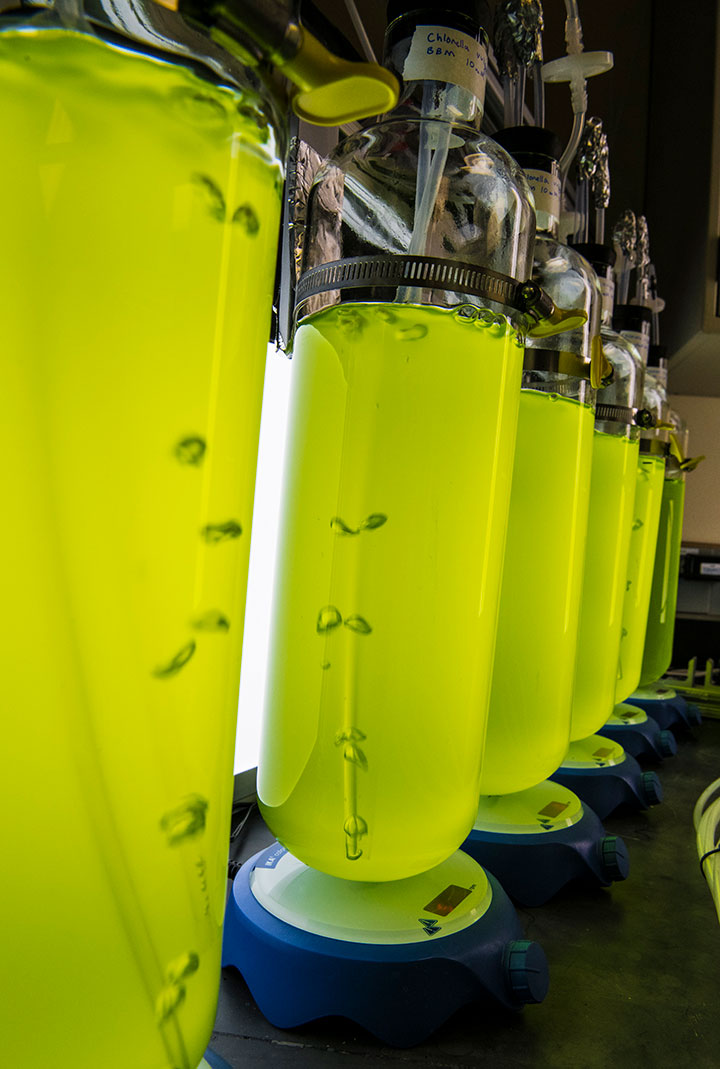DISCOVR Algae Consortium Launches Call for Collaboration to Lower Cost of Algae Biofuels and Bioproducts
Driving down costs for algae-based biofuels and bioproducts involves enhancing algae productivity through selection of the most promising algae strains and implementation of effective cultivation strategies. To support this effort, NREL and its national laboratory partners formed a consortium project called Development of Integrated Screening, Cultivar Optimization, and Verification Research (DISCOVR).
The collaborative consortium—sponsored by the U.S. Department of Energy's (DOE's) Bioenergy Technologies Office—developed a standardized pipeline for assessing candidate algae strains. The goal is to produce cost-effective bioenergy and bioproducts from algae while helping to strengthen the U.S. bioeconomy.

A Chlorella strain of algae, a promising precursor for biofuel and bioproduct synthesis, grows in illuminated photobioreactors in the NREL Algae lab in Golden, CO. Photo by Dennis Schroeder, NREL
DISCOVR includes researchers from four national laboratories—NREL, Pacific Northwest National Laboratory, Los Alamos National Laboratory, and Sandia National Laboratories. Outdoor testing of cultivation strategies and new algae strains’ performance is carried out by partnering with the Arizona Center for Algae Technology and Innovation (AzCATI) at Arizona State University. The overall team’s complementary expertise allows for collective testing and improving technical approaches that underpin annual DOE state of technology cost and yield metrics.
"Algae cultivation and commercial deployment are highly dependent on both the selection of the best algae cultivar and the implementation of an operational strategy that works at the anticipated large scale of algae farming,'' said Lieve Laurens, algae platform manager at NREL. "There remain tremendous challenges that need to be addressed and the formation of the DISCOVR consortium is a great start toward meeting immediate and future technical goals."
Lieve Laurens and Phil Pienkos, both principal investigators at NREL, were instrumental in the formative discussions about DISCOVR back in 2016 and are members of the core leadership team today. For the consortium, NREL provides expertise in detailed compositional analysis of novel algae species and strain variants. With NREL's high-value product isolation and conversion process suitability techniques, researchers can study how well different algae species can be turned into biofuels and bioproducts using a mimic of the NREL-developed conversion process.
A Call for Collaboration to the Algae Industry and Academia
As with any attempt at a research breakthrough, the more minds at work, the faster progress can happen. Therefore, the DISCOVR consortium is extending an open invitation to the algae industry and academia to contribute to the research and help enhance algae productivity.
The goal of this call for collaboration is to solicit the top algae strains, tools, and techniques from the greater algae community to assist in cost reduction when producing fuels and products from algae feedstocks. Such collaborative projects will give industry and academia an opportunity to partner with the four national laboratories in DISCOVR, as well as AzCATI, to help transition algae technologies toward commercial demonstrations.
"This ongoing call for collaboration that we're launching now offers the opportunity to bring new ideas to bear and bring the best minds in the algae community together," said Pienkos. "We hope this will move the needle in getting us closer to commercialization of algae production for fuel and products."
Proposals submitted to the call for collaboration will be reviewed on an ongoing basis. For more information and a proposal template, please email [email protected] and/or visit the DISCOVR website.
Last Updated May 28, 2025
